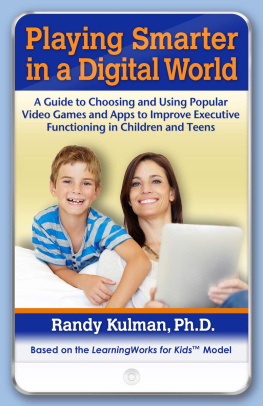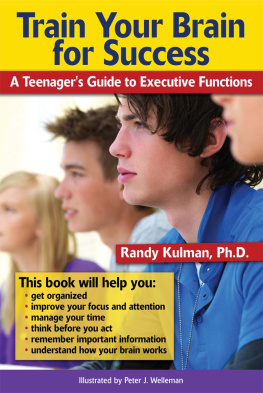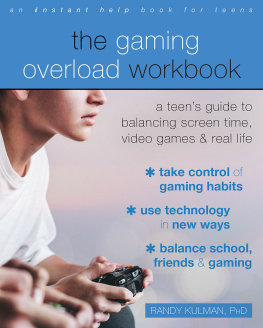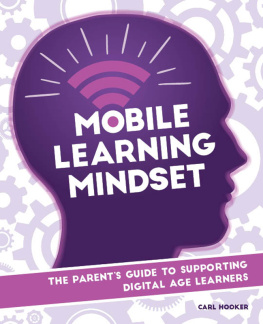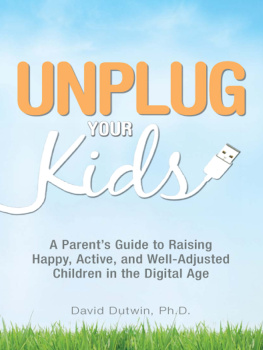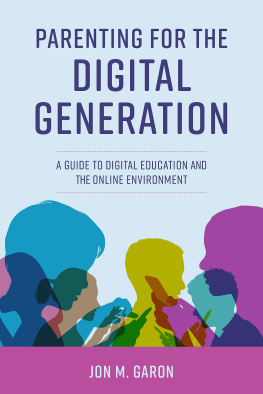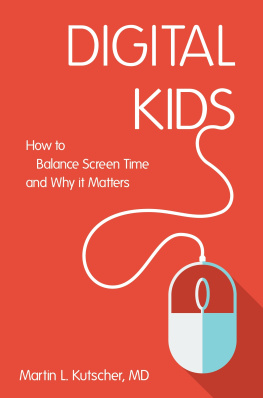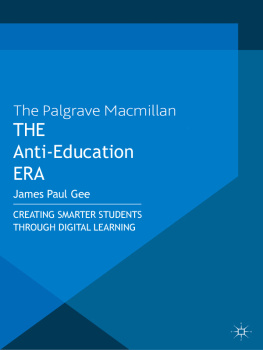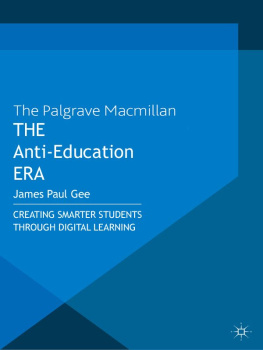Copyright 2014 Randy Kulman, Ph.D.
All rights reserved.
No part of this book, except those portions specifically noted, may be reproduced or transmitted in any form or by any means now known or to be invented, electronic or mechanical, including photocopying, recording, or by any information storage or retrieval system, without written permission from the publisher, except for brief quotations. Requests for permission or further information should be addressed to the publisher.
Book Design and Layout: Babs Kall, Kall Graphics
Cover Art: Michael Wall, Kall Graphics
Specialty Press, Inc.
300 Northwest 70th Avenue, Suite 102
Plantation, Florida 33317
(954) 792-8100 (800) 233-9273
Printed in the United States of America
Library of Congress Cataloging-in-Publication Data
Kulman, Randy, 1955
Playing smarter in a digital world : a guide to choosing and using popular video games and apps to improve executive functioning in children and teens/Randy Kulman.
pages cm
Summary: A book to help parents to make their childrens digital playtime educational. Digital play, when used appropriately, can be a powerful tool for learning skills such as planning, time management, cooperation, creativity, and digital literacy. The books clearly articulated strategies help parents use digital media in a more effective manner and, at the same time, set effective limits and implement a healthy play diet for their children. A section devoted to exploring specific strategies for using digital media with children in specific populations--such as children affected by ADHD, autism spectrum and learning disorders, and other mental health and educational issues--is also featured, as is a list of specific games, apps, and tools to make game-based learning most effective-- Provided by publisher.
ISBN 978-1-937761-15-8 (paperback)
1. Video games and children. 2. Internet and children. 3. Digital media. 4. Parent and child. 5. Child development. 6. Learning, Psychology of. 7. Human information processing. 8. Brain--Localization of functions. 9. Education--Effect of technological innovations on. 10. Educational technology. I. Title.
HQ784.V53K85 2014
302.231--dc23
2014008584
Acknowledgments
I have had the great fortune of being a father, a son, a husband, a student, a teacher, and a helping professional. In all of these roles, I have had tremendous opportunities to learn and occasionally to teach. In todays digital world. It is fascinating for me to observe how children are often our teachers when it comes to mastering technology. And so it is that my first acknowledgment is to my own children and to the thousands of young people I have treated throughout my years as a child clinical psychologist. They have taught me about their favorite video games and apps, showed me what they learn from them, and helped me to think about ways that adults can interact with kids to optimize the value of technology. Ive learned a great deal from young people who are struggling with basic reading, writing, organization, and time management skills, who have described how technologies have been helpful in their lives. Their interest and engagement with technology motivated me to learn more and eventually led me to write this book.
I would like to thank my professors Ralph Barocas and David Elkind at the University of Rochester, who encouraged my interest in play, learning, and education. I would also like to thank Peg Dawson and Richard Guare, whose theories of executive functioning I have used as a model for describing these important skills.
It has been a genuine pleasure working with Harvey Parker, my publisher at Specialty Press. I am grateful for his patience, encouragement, and insights throughout the writing process. I also appreciate the efforts of Kerri Hartman, Babs Kall, and Mike Wall for their creativity and thoroughness in completing this book.
I am very grateful for my staff at LearningWorks for Kids, James Daley, Patrick Elliot, and Nick Pollitelli, for all of their ideas, editing, and assistance in writing this book. Id also like to thank my friend Pat Mullaney for her inspiration and suggestions.
Id like to thank my staff at South County Child and Family Consultants, including Desiree Williford for her help with footnoting and editing and Deborah Swauger for all of her help over the course of 15 years and for her thoughtful comments and copyediting.
Most of all, I would like to thank my family and friends for the support that they have given me. My mother and father always encouraged me to learn more about my interests. My dear friends Bill Sopp, Jim Gannaway, Earl Greco, and Donald Weinberg always have a kind word and support for all of my efforts at LearningWorks for Kids. I want to thank my children Scott, Seth, Ethan, Gabe, and Lauren for their teasing and badgering (and love), which keeps me from taking myself too seriously. I want to thank my wife Gail for her sustained support and patience with me throughout the course of this book and all of my other projects. Her willingness to go on vacations with me while Im busy writing and working and her encouragement to pursue my dreams are invaluable.
Randy Kulman, Ph.D.
Table of Contents
Index
Preface
In 2010, I overheard my 16-year-old son excitedly speaking in French while playing Modern Warfare 2, the newest Call of Duty game at that time. He was so engaged in his conversation with another online player that he didnt notice me when I walked into his bedroom to observe him. It turns out that he had been playing with a group of French-speaking Canadian teenagers for a number of days and was apparently taking the opportunity to brush up on his language skills. I didnt think too much about it until his senior year in high school, when he was presented an award by the state of Rhode Island for his proficiency in the French language. Looking back, I shouldnt have been surprised. After all, he had been fully engaged, attentive, focused, and highly motivated to use his language skills in order to play the game and destroy his enemies.
In my work as a child clinical psychologist, I spend a fair amount of time discussing a childs difficulties with learning, attention, and effort. Children often hear their parents or educators describe their shortcomings, which can be a very harsh blow to their self-esteem. As a result I try to emphasize the childs strengths and interests. I ask children how they spend their free time, what they enjoy, and what makes them feel good. Frequently, childrens strengths are connected to video games and technologies. They can focus for hours on games and are extremely techno-savvy. Many parents even admit going to their children for help with using a new cell phone or app.
The parents I interview point out that their children (who often have learning and social/emotional difficulties) are far more likely to be able to sustain their attention to digital media than to traditional educational materials such as books and conversation. Their childrens persistence in beating a game or completing a task within a video game also far exceeds what they see in other areas of their childrens lives. They observe their childrens motivation to master a difficult video game, search for things on the Internet, or learn to use new apps and wonder why this obvious desire to learn doesnt transfer to classwork. They may also notice their childs readiness to try something new and learn from mistakes when it comes to technology but not when it comes to school.
As I observed this phenomenon during the 1990s and the first decade of the 21st century, I began to ask myself a few questions. First, why were the children I saw in my office so incredibly interested in and engaged with digital media and technology? Their involvement with and motivation to use these technologies seemed to far exceed that of other children.
Next page
